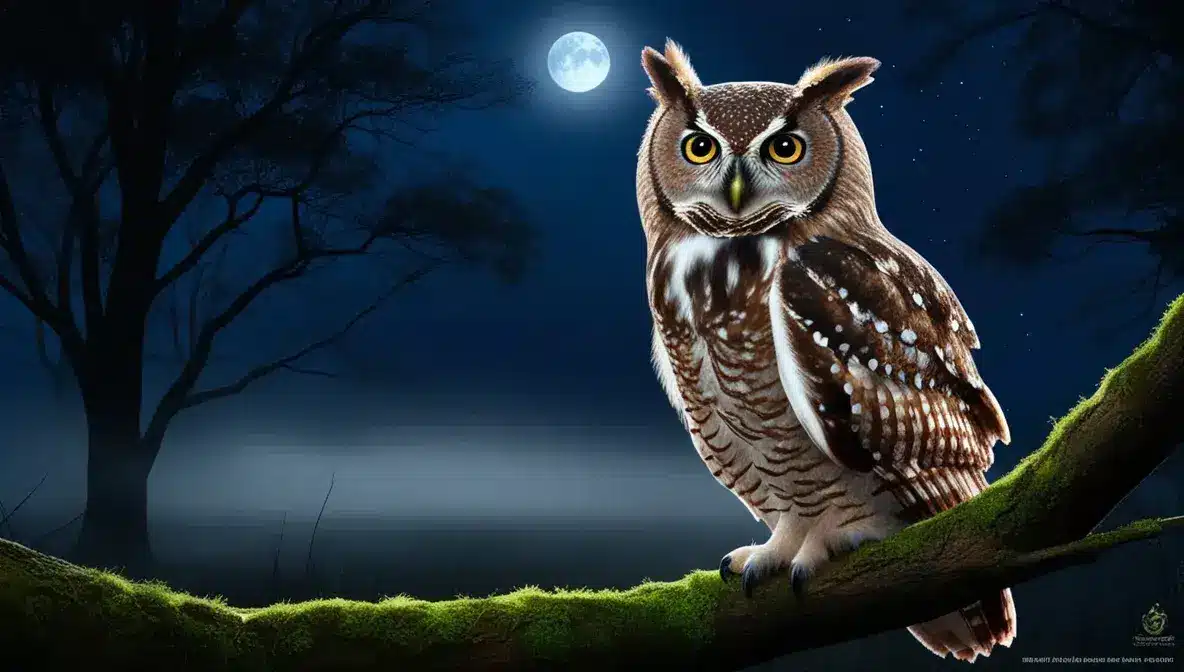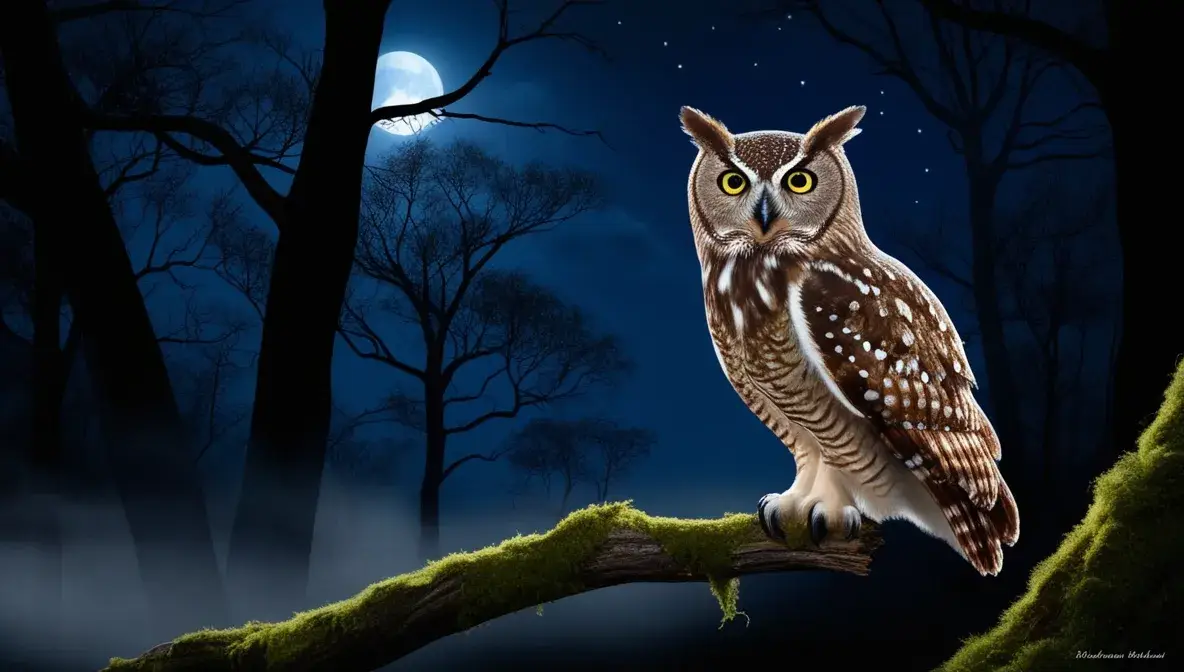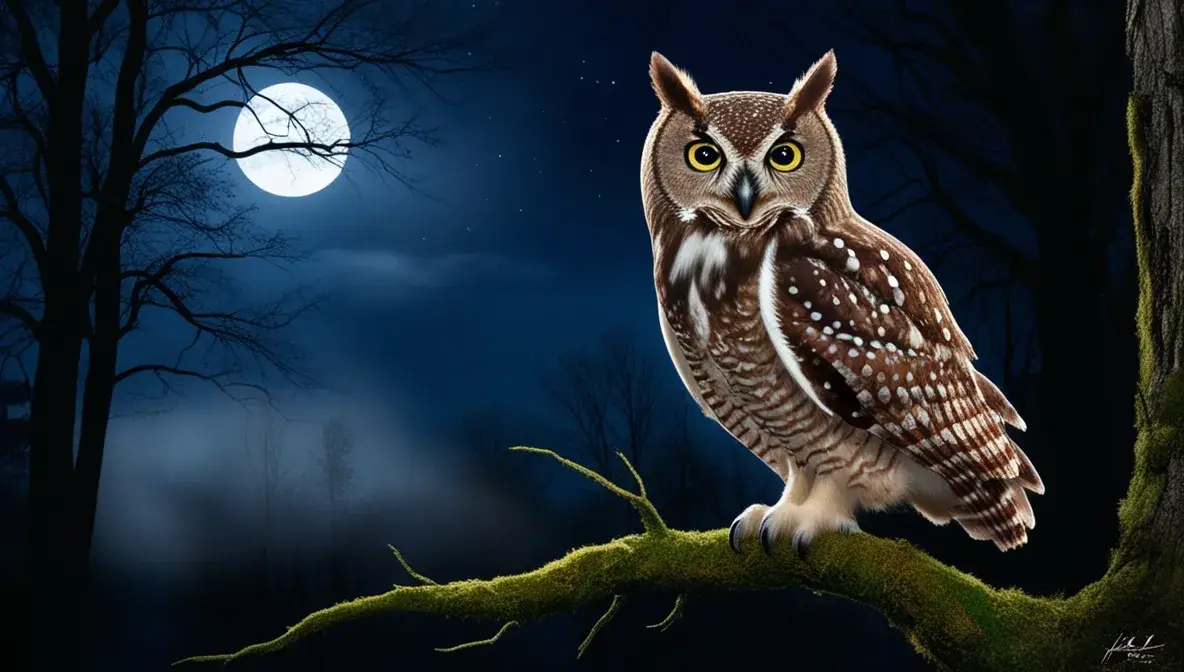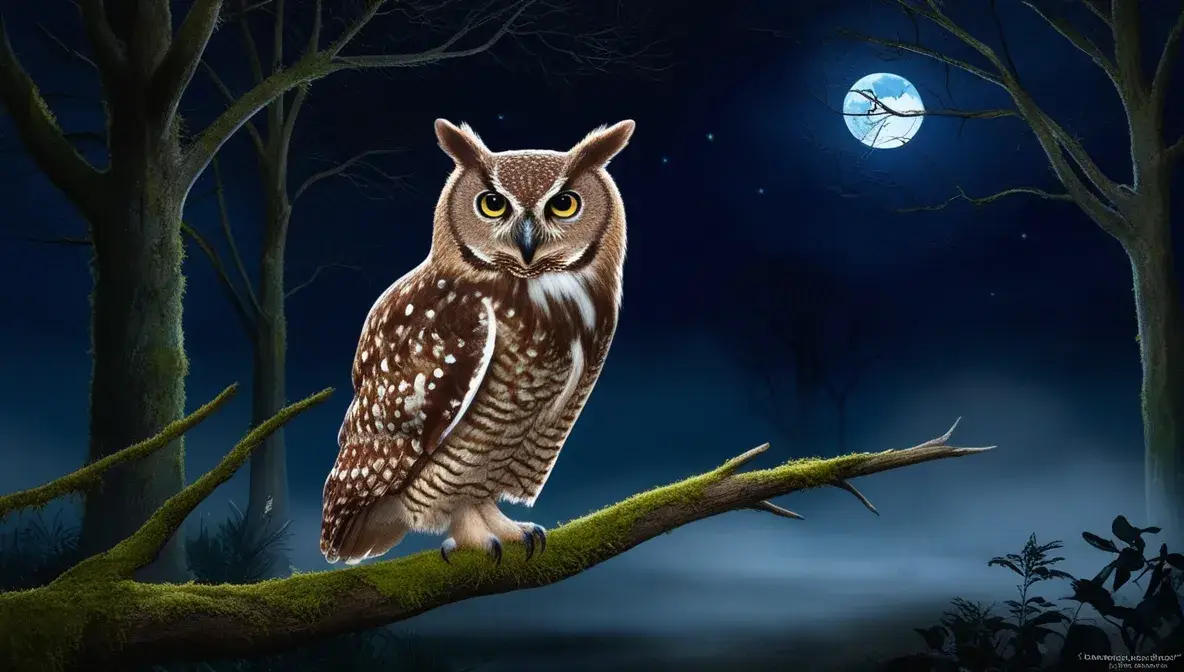What does it mean when you hear an owl hoot at night? You might be wondering if there’s a deeper meaning behind the mysterious sound echoing through the quiet darkness. Whether you’re an animal lover or just curious, the hoot of an owl has intrigued humans for centuries, sparking wonder and superstition.
In this article, we’ll explore the fascinating symbolism, spiritual connections, and even the science behind owl hoots. Get ready to uncover what this nocturnal sound could really be telling you, and why it’s far more than just a call from the wild. Let’s dive in!
Understanding Owl Behavior
Owls are fascinating creatures that play a vital role in the ecosystem. Their behavior is as intriguing as their appearance, so it’s essential to understand what is happening when you hear them call at night.
Nocturnal Habits
Owls are primarily nocturnal, meaning they are most active during the night. During these hours, they typically engage in hunting, mating calls, and territorial displays. Owls have specialized adaptations that make them superb night hunters, including excellent night vision and exceptional hearing.
Hooting as Communication
Owl vocalizations serve various purposes. The hoot you hear at night can mean different things depending on the context:
- Mating Calls: Male owls often hoot to attract females during the breeding season.
- Territorial Claims: Hooting is also used to mark territory, warding off other males.
- Communication: Beyond hooting, owls use different calls to communicate dangers or alert their partners.
Types of Calls
Understanding the types of owl calls can provide more insight into what you might be hearing. Here are a few examples:
| Type of Call | Description | Purpose |
|---|---|---|
| Hooting | Deep, resonant sounds | Territory marking and mating |
| Barking | Short, sharp sounds | Warning or alarm signals |
| Whining | High-pitched, wavering sounds | Distress or discomfort |
The Symbolism of Owls in Different Cultures

Throughout history, owls have been associated with various myths, legends, and beliefs. Understanding these cultural interpretations can imagine what might be symbolized when you hear an owl hoot at night.
Ancient Civilizations
- Greek Mythology: The owl is often associated with Athena, the goddess of wisdom. Hearing an owl is considered an omen of enlightenment and wisdom.
- Native American Tribes: Different tribes view owls variably. Some see them as protective spirits, while others view them as omens of death.
- Egyptian Culture: In ancient Egypt, owls were associated with the afterlife and were depicted as symbols of protection against evil.
Modern Interpretations
In contemporary society, interpretations remain varied. Many people feel that hearing an owl hoot at night is a sign of change or transition in their lives. Some consider it a reminder to pay attention to their intuition and inner wisdom.
- Change: A common interpretation is that seeing or hearing an owl signals upcoming changes or shifts in life.
- Mysticism: For some, owls represent mystery, intuition, and the unknown.
What Does It Mean When You Hear an Owl Hoot at Night?
When you hear an owl at night, you might wonder what message it holds for you personally. The significance can vary widely based on individual beliefs, experiences, and the circumstances surrounding the encounter.
Personal Intuition and Reflection
One of the essential aspects to consider is your intuition. If you hear an owl hoot during a time of contemplation or decision-making, it may encourage you to trust your instincts. It can be a call for self-reflection.
As a Sign of Guidance
Many believe that the owl symbolizes a guide during difficult times. Hearing an owl hoot might suggest that guidance or support is nearby, whether in the form of friends, family, or even spiritual allies. In this context, pay attention to your surroundings for signs that require a deeper understanding.
Messages from the Spiritual Realm
For those inclined towards spirituality, an owl’s call is often perceived as a message from the spiritual realm. It can indicate:
- Awareness of Changes: Preparing for life transitions or transformations.
- Awakening of Intuition: Heightened awareness of your intuition, encouraging you to listen more closely to inner messages.
- Connect with the Unseen: An invitation to explore your spiritual path and connect with your higher self or spiritual guides.
The Ecology of Owls
To better appreciate what it means when you hear an owl hoot at night, it’s helpful to understand the role of owls in the ecosystem. Their ecological significance underpins many of the cultural beliefs surrounding them.
Predatory Role
Owls are apex predators within their habitats. Their primary role includes:
- Controlling Rodent Populations: A single pair of owls can consume thousands of rodents in a single season, helping to stabilize local populations.
- Maintaining Ecosystem Balance: By preying on small mammals and other creatures, they contribute to the balance of various ecosystems.
Biodiversity Indicators
Owls are considered bioindicators. Their presence or absence can give vital clues about the health of an ecosystem. A healthy population of owls can indicate clean water sources and adequate habitats, thereby showcasing a balanced ecosystem.
Common Species of Owls
Here is a brief overview of common owl species you might encounter and their unique characteristics:
| Species | Habitat | Hooting Pattern | Notable Characteristics |
|---|---|---|---|
| Great Horned Owl | Forests, deserts, urban areas | Deep, resonant hoots | Large size, tufted ears |
| Barn Owl | Fields, open grasslands | Hissing calls, low hoots | Heart-shaped face, silent flight |
| Eastern Screech Owl | Wooded areas, suburban regions | Trilling or whinny calls | Small size, various color morphs |
| Barred Owl | Swamps, wooded areas | “Who cooks for you?” hoots | Distinctive horizontal bars |
How to Attract Owls to Your Backyard

If you’re fascinated by owls and want to invite them into your environment, here are some effective strategies:
Habitat Creation
Creating a suitable habitat is essential. Consider the following steps:
- Plant Native Trees: Owls prefer trees for perching and nesting. Ensure you provide a variety of trees and shrubs.
- Install Nesting Boxes: Some owl species may use artificial nesting boxes if natural sites are scarce.
- Provide Food Sources: Maintaining a healthy ecosystem encourages rodents and insects, potential prey for owls.
Avoiding Pesticides
Using pesticides can deter owls from visiting your backyard. Instead, aim for natural pest control methods. Establishing a balanced ecosystem attracts owls by ensuring a food supply.
Limit Outdoor Light Pollution
Bright lights can disrupt the natural behaviors of owls. Consider using minimal outdoor lighting, or use lights that are positioned low to the ground to allow the natural night environment to flourish.
The Science Behind Owl Hooting

Understanding the biology behind why owls hoot can help demystify the behavior.
Vocal Anatomy of Owls
Owls possess specialized anatomical features that produce their iconic hoots:
- Syrinx: Unlike humans, owls use a vocal organ called the syrinx, located at the base of the trachea. It allows for a wide range of sounds.
- Air Sac System: The air sacs amplify their vocalizations, resulting in the resonant hoots we hear.
Sounds and Frequencies
Owls can produce sounds across a wide frequency range. Different species have unique sounds formed through variations in size, shape, and anatomy. The variability can also impact the volume and distance the hoots travel, affecting how far away you might hear them.
Final Thoughts on What It Means When You Hear an Owl Hoot at Night
Hearing an owl hoot at night is an event rich in meaning, blending biology, ecology, and various cultural interpretations. Whether you view it as an omen, a call for introspection, or simply an appreciation of nature, the sound of an owl can resonate deeply within us.
Being aware of the ecological role owls play emphasizes the importance of biodiversity and conservation. While their hoots evoke a mystical aura, the reality is they are part of a complex ecosystem that warrants respect and protection.
In conclusion, the next time you hear an owl calling in the dark, consider the messages it may carry, the ecological role it plays, and the culture and traditions intertwined with this fascinating bird. Whether as a symbol of wisdom or a messenger from the spirit world, the hoots you hear can provoke profound thoughts and insights. Enjoy the connection you share with these remarkable nocturnal creatures and the secrets they may whisper through the night.
Explore the deeper spiritual meaning behind various life experiences at MeaningFeat.

Tina Morris is an expert in interpreting spiritual meanings behind worldly events and dream symbolism. With a deep understanding of mystical insights, she helps readers unlock the hidden messages in their dreams and daily experiences. Her work guides those seeking spiritual clarity and enlightenment.
